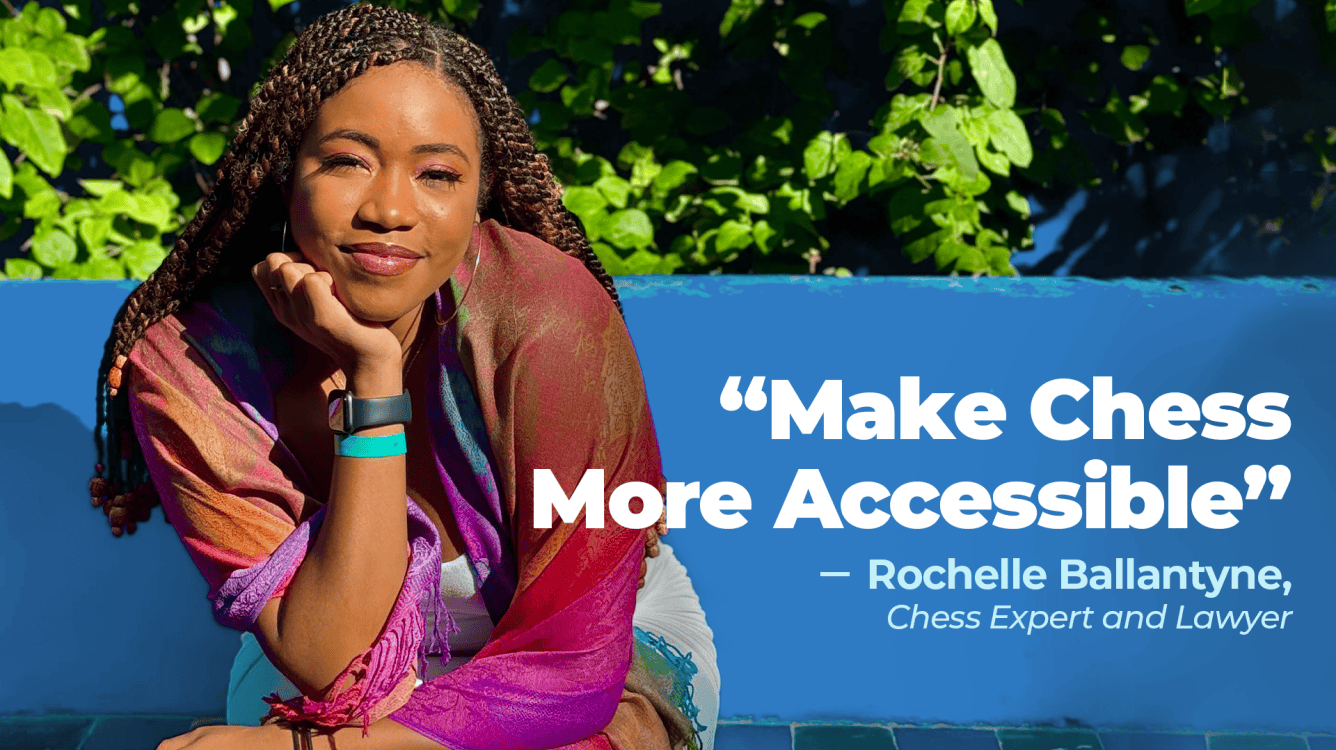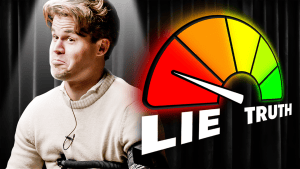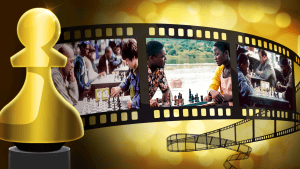
12 Years Later, "Brooklyn Castle" Star, Now Lawyer, Reflects On The Chess World!
Rochelle Ballantyne is a USCF candidate master as well as a lawyer, and was once featured in the award-winning documentary, Brooklyn Castle. Her inspirational story ranges from being a student of the chess success hotspot, I.S. 318, to being recognized as one of the strongest Black women chess players in history.
On top of being an active member of the chess community, she recently passed the bar to become a lawyer! I had the fortunate opportunity to interview Rochelle and discuss race, class, passing knowledge, and the status of the chess world to explore the human blunders we make, or worse, ignore.
So I've heard in previous interviews that your grandmother introduced you to chess. How did learning the game change your familial relationships?
Before, I was a very rambunctious child. I wanted to be out playing with the kids and my grandmother was having none of that. So she taught me the game and that's how I started playing. Once I beat her, she stopped playing with me, in part because I think she hates to lose more than I do but also because I think she knew there wasn't more she could teach me. It was more so, “I will urge you on from afar,” which was fine and contributed to my growth. I appreciated my grandma for the role she played in getting me started.
Then my mom took on the role of making sure I got to tournaments. I think when my mom realized that this was something I felt strongly about, she put all of her efforts and energy into making sure I got whatever resources she could find to help me get better. So I guess to answer the original question, chess was my original insight into the power of the women in my family and family in general. Even today family and friends rally behind me and my dreams because they believe in me and ain't that a beautiful thing?
Chess was my original insight into the power of the women in my family and family in general.
What are your thoughts on the tradition of women passing the game on to the next generation?
I like to talk about the role of women in helping me succeed, but the women who help me succeed are very mediocre chess players themselves. So I think that speaks to the resilience of caring for your children. Your child tells you that they want to do this thing and you move heaven and earth to make sure that they have the resources in order to get to where they need to go. I wasn't playing in official chess tournaments. My mom had me in a Wendy's or in the park playing with random people trying to help me get better. I think that's a testament to the fact that this game is universal, right?

You don't need to have the fancy coaches and the fancy software to get better. You just need to have a willingness to learn. Although the fancy software and the extra resources are definitely helpful but not something that my mom or I could afford when I was younger.
It’s a little over 10 years since the award-winning documentary you're featured in, "Brooklyn Castle," came out. I'm curious if you ever reflect back on that time and wonder what could’ve been done differently?
I had really great coaches. I had people who were dedicated to making sure I succeeded. And I was really grateful for that. I don't know what more I could have wanted. We didn't have much, but they made it work. I might not have been able to reach my chess goals, but I'm a lawyer now. I'm really blessed. Most of my education has been paid for and I don't think that would have happened without chess.
But as you get older, it's not as if there are plenty of affordable programs for adults. What has your experience been like through that transition?
As an adult the transition to getting better is much harder. Once you've graduated and have a job, you have kind of made it, right, in the sense that there are less people invested in your growth as a chess player. And that's how it should be. The focus should be on inclusion and replication. I guess I'm considered a success story. So now it's time to replicate the things that went into getting me to where I am for others, and it’s something I push for.
I will gladly take a backseat if it means we create an environment where more people who come from my background and who look like me are able to benefit from the same resources and mentorship I experienced to achieve their dreams, whether it be chess or something else.
The focus should be on inclusion and replication.
I think as an adult, you shift from being the mentee to the mentor. It definitely becomes harder to dedicate your time to playing and studying at the same level that you did when you were younger. But I think that's also natural when you have other things that distract you from giving your all to this game. My focus has now shifted into a mentorship and advisory capacity. I don't want Black girls to have to go through the same things that I went through when I was younger.

I had a community, but I didn't have a community of people who looked like me growing up. If we're trying to solve retention, I think it would be more helpful for girls—and Black girls specifically—to see more of them in these spaces so that they don't feel alone or isolated. There's still such a gender divide even in local tournaments.
I imagine chess isn't necessarily seen as cool and I wouldn't have played—and kept playing—if not for a woman. So I think there's power in seeing that there is a place for you in these spaces and that you're not alone and more than that that you have a community urging you forward.
I'm curious about your journey to becoming a lawyer. In the past, you mention taking a break from chess. You even took a break from school to see if being a lawyer was something you wanted.
Growing up during stop-and-frisk in an overpoliced neighborhood began my initial interest in the legal field. As I got older and more versed in what was happening in my community, I wanted to understand the ways in which laws and systems serve as an oppressive force and how as a lawyer I would help counteract that. The plan was to go to straight into law school after college but then Trayvon Martin, Michael Brown, and the election of Trump happened in succession and I wasn't sure I had the heart or mental fortitude to go into public defense work.
I wanted to understand the ways in which laws and systems serve as an oppressive force and how as a lawyer I would help counteract that.
So I took time off instead to calibrate. Turns out that calibration led me to my passion, which some would argue might be worse than public defense work: the defense of our children. "Brooklyn Castle" played a role here as well. I often am considered lucky for "making it out of my hood" but I don't know that I feel lucky, I largely feel sad, to be honest. The people who I grew up with are just as capable as I am but just didn't have access to the same resources, resources I received because I played chess. I don't think a child deciding to engage in a hobby should prevent or deny others from receiving similar resources to help them succeed in their own way.
The people who I grew up with are just as capable as I am but just didn't have access to the same resources, resources I received because I played chess.
So I went to grad school to see if I should do policy work instead of law. But ironically, my program taught the intersection of education and law and I learned about the ways education lawyers work to advocate for equitable access and redefining what it means to have a decent public school education.

All this to say, my hibernation periods are usually the times for me to reflect on whether or not the things I want to do are still things I want to do. And if so, what's a healthy way for me to engage in them that still feels good to me.
Did that help you with passing the bar?
The bar is a horrible experience. Haha. I completely stopped playing during the three months I was studying for the bar because it takes up so much of your mental... the amount of memorization you have to do, the amount of practice and study you have to commit to. I didn't have any brain capacity for anything else. Playing chess is usually something that grounds me, but if I'm studying for the bar and losing my chess games, that would have sent me into a spiral and was just not something I needed at the moment.
I completely stopped playing during the three months I was studying for the bar...
But now I've come back and I'm a lawyer. So I don't have to worry about the bar anymore. I just have to worry about being a good lawyer, a good advocate, and I guess a sometimes-good chess player.
Do you ever look at the current competitive chess landscape from a lawyer's perspective?
Yes, definitely. I think chess and law, and the skills you get from both, are pretty transferable, especially in my current role as a litigator. I'm in an adversarial role, and it is literally my job to argue with people all day, every day. It’s not something I do in chess, but when I play chess, it is my job to beat my opponent. Chess just feels like a part of the person who I am now. All the things I do, I think of it from a chess landscape because I started playing so young. All of the skills and lessons I developed, I take with me in every space I enter.
If there was one thing that you would change in the chess world, what would that be?
I would really like us to be more serious about initiatives we claim to be spearheading. If diversity and inclusion are something the chess community is serious about, you cannot have that conversation if you don't talk about the money barrier that comes with playing chess. It's like, okay, you have tournaments, but what's the tournament fee? How much is the hotel? The airfare? These costs add up and become such a burden on low-income communities.
If diversity and inclusion are something the chess community is serious about, you cannot have that conversation if you don't talk about the money barrier that comes with playing chess.
I think another thing that I would change is there are too many people in leadership positions that are antiquated. Many people who seriously play chess are under the age of 30. If that's the case, that means the people in leadership positions should have ideas that cater to that population. You want more women in chess, but you don't have women on your board? You want more Black and Brown people in chess, but you don't have those people on your board? Are we going into more low-income communities to talk to community leaders so they can identify talent that can be nurtured and fostered? I just cannot conceptualize anything changing if folks don't let go of that power and pass it on to people who are just as dedicated and have new ideas they could bring to the field.
On the other hand, I'm learning that change can be incremental and strides have been made in the chess field to address some of these issues, but I also don't know that I believe change needs to continue to be incremental when there are actual, implementable solutions to these problems.
Are we going into more low-income communities to talk to community leaders so they can identify talent that can be nurtured and fostered?
Even going further than the US chess perspective, look at it from a global perspective. I'm on the board of The Gift of Chess, and the goal is to get a chessboard in the hands of every child. And these are the types of conversations we've been having.

I just met with a lady who works at FIDE and she's from Trinidad. Her specific role is making sure Caribbean countries have chess access and resources. I'm a proud Trinidadian. That's where my grandmother was a teacher and where she learned how to play chess. It's where my mother calls home. I didn't even know there were strong chess players in Trinidad, let alone across the Carribbean. Even still, the lady from FIDE was telling us about the difficulties that chess players have in Trinidad with reaching these international tournaments or even growing chess in their communities due to a lack of resources.
There are so many aspiring chess players on the African continent who love this game, who play whenever and however they can despite and in spite of the lack of resources. People throw around the terms “diversity and inclusion” with too much levity. If we're serious about diversity, we would go to these African, Caribbean, Latin American countries and ask them, what do you need?

Where is your infrastructure failing that is preventing you from giving these children access to this game? How can we help? FIDE is able to find funding for tournaments with like hundreds of thousands of dollars in cash prizes, but they also, at the very minimum, need to help improve the chess infrastructure of the countries who want to actively be part of FIDE events. I admit that there might be a lot of movement behind the scenes being done and if so I will gladly take accountability for being loud and wrong, but until then....
There was a time you even went to Africa with GM Maurice Ashley, right? How was that experience, and was there a similar discussion even back then?
Yeah, we were invited to Ghana during the year of return, I believe. Maurice was in talks with coaches from various countries in Africa about what it would look like for him to bring the top players, I guess, from each country to a central location and lead a chess workshop for them to improve their players.

When I went to Ghana, that was the first time I learned how little these countries have but how brilliant they are. There's obviously interest and players good enough to get to a decent level. But how do we get them there? How do we feed into them?
If we're talking about chess as an avenue to achieve your dreams, you have to put your money where your mouth is. There are people, children, who want the chance to be great—I hope we can move in a way that helps them get there.
Earlier you mentioned The Gift of Chess. Can you talk more about it?
The Gift of Chess is essentially how I pay it forward. They want to donate one million chess sets by 2030 because everyone at the Gift of Chess believes and understands the role chess has in changing lives. The head of The Gift of Chess worked with FM Tani [Adewumi] and helped him get from where he was to where he's at now. Similarly, many people helped me get from where I was to where I'm at now. What if we provided resources to kids from similar backgrounds in the same capacity?
We're not big enough to provide chess coaching, mentorship, and the pathway to college like other programs do. But if we put these chess sets in the hands of local community organizers who already know the kids that are interested in playing, who knows what they can do with that?
What if we provided resources to kids from similar backgrounds in the same capacity?
Countries all over the world that are like, “All of our kids love chess, but we only have one chessboard to distribute amongst our 40 to 50 kids.” Okay, we'll get you more chessboards. It's such a simple idea and cool concept that's already changing lives in these communities. I'm so lucky and grateful to have been asked to be on the board and be a part of this mission and this journey to help actualize that change.



